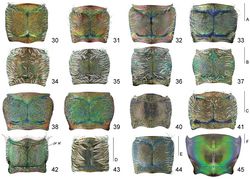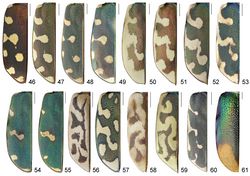Cicindela (s. str.) herbacea herbacea
| Notice: | This page is derived from the original publication listed below, whose author(s) should always be credited. Further contributors may edit and improve the content of this page and, consequently, need to be credited as well (see page history). Any assessment of factual correctness requires a careful review of the original article as well as of subsequent contributions.
If you are uncertain whether your planned contribution is correct or not, we suggest that you use the associated discussion page instead of editing the page directly. This page should be cited as follows (rationale):
Citation formats to copy and paste
BibTeX: @article{Matalin2016ZooKeys, RIS/ Endnote: TY - JOUR Wikipedia/ Citizendium: <ref name="Matalin2016ZooKeys">{{Citation See also the citation download page at the journal. |
Ordo: Coleoptera
Familia: Carabidae
Genus: Cicindela
Name
Cicindela herbacea Klug, 1832 – Wikispecies link – Pensoft Profile
General distribution
Asia Lebanon.
References
Lebanon – Wiesner 1992[1]: 127; Puchkov and Matalin 2003[2]: 105; Franzen 2007[3]: 13; Deuve 2011[4]: 129.
Distribution
Lebanon, Liban-Nord: Bcharré, Les Cèdres, VI. 1997 1♂1♀ (cIOv); Bcharré 1♀ (after Franzen 2007[3]); Tannourine 1♀ (after Deuve 2011[4]).
Comments
Until recently both these species were recorded from Syria, Lebanon and Israel by several authors as Cicindela herbacea Klug (Valdenberg 1983[5]; Nussbaum 1987[6]; Wiesner 1992[1]; Puchkov and Matalin 2003[2]; Chikatunov et al. 2006[7]; Franzen 2007[3]; Ptashkovsky 2009[8]). However, according to recent data Cicindela herbacea does not occur in Israel (Deuve 2011[4], 2012[9]). The nominative subspecies occurs in Lebanon and Syria; Cicindela herbacea aleppensis Deuve, 2012 is recorded from north-western Syria, while Cicindela herbacea perreaui Deuve, 1987 and Cicindela herbacea colasi Deuve, 2011 are found in Turkey Tunceli and Adana Provinces, respectively. On the basis of the shape of pronotum (Figs 38 vs 39), white elytral pattern (Figs 54 vs 55), size of aedeagus and shape of it apex (Figs 93 vs 97), as well as shape of internal sack (Figs 94–96 vs 98–100) we consider all studied specimens from Israel to be Cicindela javeti azari Deuve, 2011 (type locality – Lebanon, Jezzine). It should be noted that the taxonomy of intraspecific forms within the ‘campestris’-group is complex, and additional studies are necessary.
Taxon Treatment
- Matalin, A; Chikatunov, V; 2016: The tiger beetles (Coleoptera, Carabidae, Cicindelinae) of Israel and adjacent lands ZooKeys, (578): 115-160. doi
Images
Other References
- ↑ 1.0 1.1 Wiesner J (1992) Checklist of the tiger beetles of the world. Erna Bauer Verlag, Keltern, 364 pp.
- ↑ 2.0 2.1 Puchkov A, Matalin A (2003) Subfamily Cicindelinae Latreille, 1802. In: Löbl I Smetana A (Eds) Catalogue of Palaearctic Coleoptera. 1. Archostemata – Myxophaga – Adephaga. Appolo Book, Stenstrup, 99–118.
- ↑ 3.0 3.1 3.2 Franzen M (2007) A new species of tiger beetle of the Cicindela campestris group from southern Turkey, with remarks on the identity of C. herbacea Klug, 1832 and other taxa related to C. desertorum Dejean, 1825. Spixiana 30(1): 13–24.
- ↑ 4.0 4.1 4.2 Deuve T (2011) Esquisse pour l’étude des Cicindela proches de campestris, desertorum, herbacea et javeti au Proche-Orient (Coleoptera Caraboidea). L’Entomologiste 67(3): 125–138.
- ↑ Valdenberg A (1983) A key to the species of Cicindelidae of Israel and the Sinai. Shappirit (Journal of the Israel Entomology Center) 1: 38–48. [In Hebrew]
- ↑ Nussbaum Y (1987) Tiger beetles from Israel and Sinai (Coleoptera: Cicindelidae). Yes Quarterly 4(1): 7–15.
- ↑ Chikatunov V, Kravchenko V, Müller G (2006) Carabidae (Coleoptera) collected in the Israeli light trap survey and their association with the major phyto-geographical zones of Israel Esperiana. Buchreiche zur Entomologie 12: 289–297.
- ↑ Ptashkovsky Y (2009) The Beetles of Israel. Private publishing, 195 pp. [In Russian]
- ↑ Deuve T (2012) Esquisse pour l’étude des populations est-méditerranéennes du grupe de Cicindela campestris (Coleoptera Caraboidea). L’Entomologiste 68(1): 3–16.


